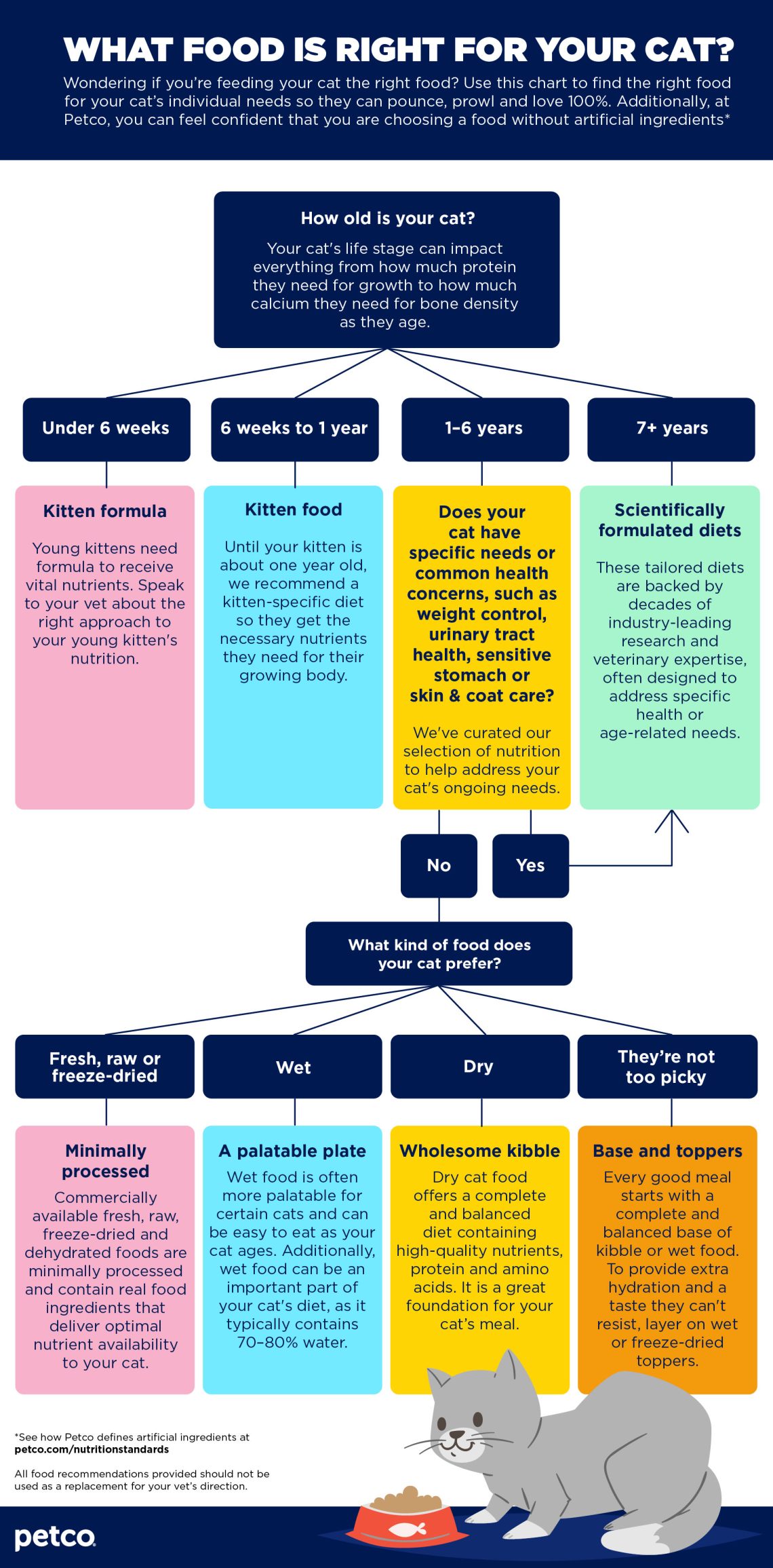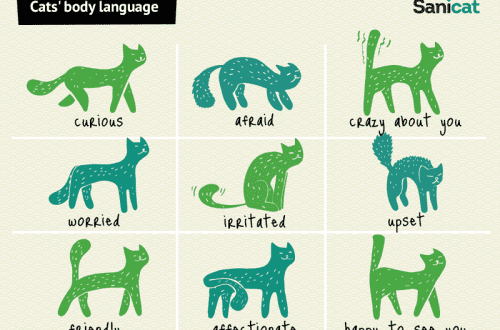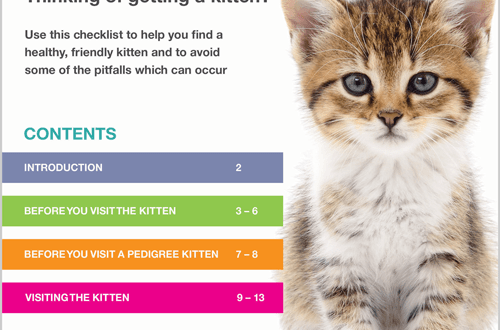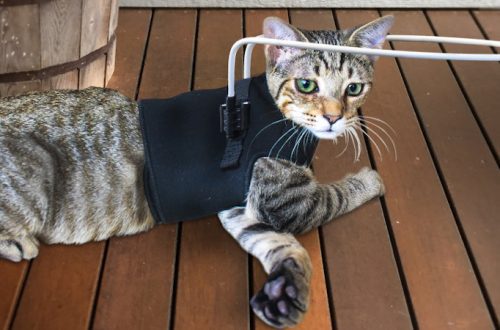
How to choose the right cat food
Choosing the right cat food and the healthiest food can be difficult. When you adopt a kitten or cat from an animal shelter, problems can arise similar to those that occur when a newborn baby is brought home from the hospital. What is the healthiest cat food? What nutrients are most important? What should be in cat food? How to choose cat food that will help your pet be healthy and alert?
Cats are carnivores and their diet mainly consists of animal proteins. In the wild, they feed on small game such as rodents, birds, and fish. However, when cats become domesticated, they rely on their owner for all nutritional needs. Before you adopt a pet, learn all about caring for it. Proper nutrition prevents health problems and ensures that the animal remains at a healthy weight appropriate for its breed and activity level.
Contents
All cats need is proper nutrition
To stay healthy, cats need the following nutrients:
- Proteins: Protein is vital for cats. It ensures the growth of muscle mass.
- Fats: Fats are often found in the form of fatty acids such as omega-3 and omega-6. As with humans, too much fat in the diet can lead to weight gain, but a balanced amount helps keep the skin and coat healthy.
- Cellulose: Cats need the right amount of dietary fiber, found in sources like brown rice, to keep their digestive tract healthy and prevent excess gas and other gastrointestinal problems.
- Water: To stay healthy, cats need plenty of fresh, clean water every day. Always give your pet as much water as he wants, leaving a filled bowl, an automatic drinker, or a reservoir that refills when you are not at home.
Pets also need a sufficient amount of vitamins and minerals contained in food. In the wild, these vitamins and minerals are found in their prey. But a domestic cat should receive the necessary amount of vitamins and minerals from its food.
Just like humans, animals need vitamins A, E, K and B vitamins. Folic and pantothenic acids are also essential for healthy growth and life. Cats produce their own vitamin C in sufficient quantities for them, unlike their owners. Additional minerals that cats need include calcium, phosphorus, and iodine. Taurine is an essential amino acid that cats need in their daily diet. If these vitamins, minerals and nutrients are present in the correct amounts in the cat food, there is no need to supplement.
Carbohydrates
You may have noticed that there’s a whole food group left: carbohydrates. Fruits, vegetables, and grains are healthy members of this category, but cats have shorter colons than omnivores (like humans) and therefore have a hard time digesting large amounts of carbohydrates. If your pet has trouble digesting certain carbohydrates, Hills Science Plan High Quality Cat Nutrition can provide an adequate supply of easily digestible carbohydrates.
When these needs vary
Kittens and lactating cat mothers need more calories and nutrients. For example, kittens need more fats, proteins, and minerals to build strong bones, while pregnant and lactating cats need higher concentrations of fats and other nutrients to support the development of their kittens. Older cats require less fat to maintain a healthy weight. At each stage of life, your cat requires different nutrients.
Choosing the Healthiest Cat Food
Choosing the healthiest cat food can take some time. Provided your veterinarian has not found any serious nutritional health problems with your cat, develop a pet feeding plan that is simple and easy to follow. Both canned and dry food provide complete nutrition.
If your cat has health concerns, your veterinarian can help you find the right food to provide them with the nutrients they need to maintain good health, including weight problems, food allergies or intolerances, and kidney health.
Some cat owners prefer to give one form of food in the morning and another in the evening. For example, before leaving for work, you can fill the bowl with dry food. Then, when you go to bed, you can offer a small bowl of wet food. This type of food helps keep your pet’s weight under control while providing plenty of nutrients for her overall well-being.
Common Nutritional Problems
How can you tell if a cat’s food is right? It’s a whole learning process, and there are a few things that inexperienced pet owners should keep in mind when it comes to feeding cats.
Do not allow overfeeding
Cats, like us, love to eat. The difference is that they will not, like us, wait twenty minutes to realize that they are full after they have emptied the bowl. Therefore, your pet may ask for supplements right after he finishes his morning dry food or evening bowl of wet food. As much as you want to, you won’t let yourself eat a second or third serving because your jeans won’t fit if you don’t listen to your body.
In the same way, if you give in to every “meow”, it leads to extra weight in no time. Therefore, watch her waist – a healthy cat should be lean and fit. You should not see any protruding ribs or bones, but when you run your hand over her sides, you should be able to feel the relief of her muscles. Overweight cats have fat folds on their belly, flanks, and muzzle, and tend to act lethargic except for normal daytime naps.
One type of food or two?
There is a common question about feeding cats: “Is it okay to give a cat only one type of food – wet or dry?”. The pet’s meal plan may include only dry food, fully providing a balanced diet, as well as fiber for healthy digestion. Read labels when buying high quality, veterinarian recommended food to make sure your cat is getting what she needs. If you are concerned that your pet is not drinking enough water, you may want to consider supplementing your diet with wet food.
Providing enough water
Due to the small size and activity level of cats, there is a common misconception that they do not need a lot of water. On the contrary, they should have plenty of fresh water available at all times. Some cats are very picky about their water source, so clean the bowl thoroughly and refill it daily. Remember that an auto-refilling water bowl is a great help for multi-cat owners as it provides a constant supply of fresh water without having to refill frequently.
Table food ban
Table scraps are a quick path to obesity for many cats as the calorie count increases without providing enough nutrients. And never give your pet chocolate, caffeinated drinks such as cola or coffee, raisins, grapes or onions: all of these foods are poison to cats. Products containing these ingredients can be fatal to pets.
Refusal of milk
Believe it or not, most cats are lactose intolerant. Feeding your cat milk can lead to gas, indigestion, and indigestion. If you want to give your pet a treat, a few bites of cat food, a small amount of catnip, or homemade cat treats are the best options.
The right cat food can keep your pet healthy and active for years to come. By choosing high quality cat food, providing enough water, and not believing some of the common myths mentioned above, you will provide the best nutrition for your furry friend.





